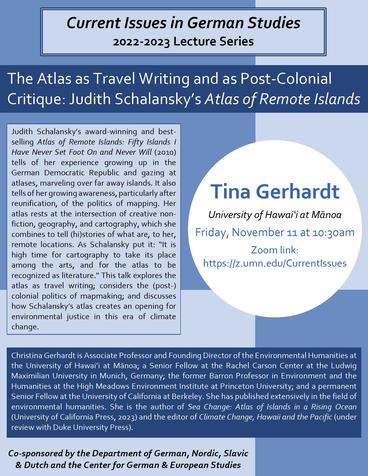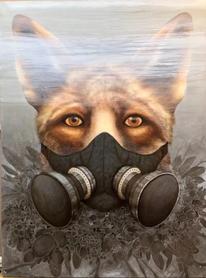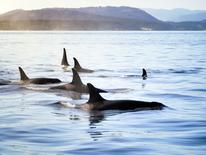Rethinking Place: A seminar for undergraduates
June-July 2023
Please share the following announcement with undergraduates in your courses:
Applications are now open for Rethinking Place: Environmental Humanities in Minneapolis and Munich, an in-person, international undergraduate seminar led by Carleton College German faculty — and former EHI affiliates! — Kiley Kost and Seth Peabody. The seminar takes place in June and July 2023 and is made possible by the Center for German and European Studies (CGES) at the University of Minnesota, with funding from the Deutscher Akademischer Austauschdienst (DAAD). Due to the generous support of the CGES and DAAD, most of students’ travel and living expenses will be covered by the program.
The seminar begins with one week at the University of Minnesota in the Twin Cities and then travels to Munich for the final two weeks. Course readings, discussions, and student work are supplemented by excursions and guest lectures, including scholars at the Rachel Carson Center for Environment and Society during the Munich portion. The seminar will be conducted in English. Knowledge of German is helpful but not required.
The deadline to apply is January 31, 2023. You can find more information and the application procedure here. Interested undergraduates can contact Kiley Kost ([email protected]) and Seth Peabody ([email protected]) with questions.
Sea-Ravens and the Terrestrial Limits of Natural History
November 11, 2022
On Friday, November 11 from 12:15-1:30 pm, join the UMN English department and the Center for Premodern Studies for Sarah Rivett on “Sea-Ravens and the Terrestrial Limits of Natural History.”
Sarah Rivett, Professor of English and American Studies at Princeton University, will speak on the raven as a literary symbol from The Book of Genesis to the classical stories of the Haida, Tlingit, and other Indigenous literatures of the Pacific West. Rivett is writing a book tentatively titled Raven’s Land which rereads American literary history through raven stories that contest US settler colonialism by disrupting origin myths. Rivett is the author of The Science of the Soul in Colonial New England (2011) and Unscripted America: Indigenous Languages and the Origins of a Literary Nation (2017). This is a hybrid event and can be attended in-person in Pillsbury 412 or via Zoom (Zoom registration link). More information, including an event abstract, can be found on the CLA website.
The Atlas as Travel Writing and as Post-Colonial Critique: Judith Schalansky’s Atlas of Remote Islands
November 11, 2022

On Friday, November 11 at 10:30am, The Current Issues in German Studies 2022-2023 lecture series will be hosting a lecture by Tina Gerhardt from the University of Hawai'i at Mānoa on "The Atlas as Travel Writing and as Post-Colonial Critique: Judith Schalansky’s Atlas of Remote Islands." This event will take place on Zoom and can be accessed via this link.
Judith Schalansky’s award-winning and best-selling Atlas of Remote Islands: Fifty Islands I Have Never Set Foot On and Never Will (2010) tells of her experience growing up in the German Democratic Republic and gazing at atlases, marveling over far away islands. It also tells of her growing awareness, particularly after reunification, of the politics of mapping. Her atlas rests at the intersection of creative non-fiction, geography, and cartography, which she combines to tell (hi)stories of what are, to her, remote locations. As Schalansky put it: “It is high time for cartography to take its place among the arts, and for the atlas to be recognized as literature." This talk explores the atlas as travel writing; considers the (post-)colonial politics of mapmaking; and discusses how Schalansky’s atlas creates an opening for environmental justice in this era of climate change.
Christina Gerhardt is Associate Professor and Founding Director of the Environmental Humanities at the University of Hawai’i at Mānoa; a Senior Fellow at the Rachel Carson Center at the Ludwig Maximilian University in Munich, Germany; the former Barron Professor in Environment and the Humanities at the High Meadows Environment Institute at Princeton University; and a permanent Senior Fellow at the University of California at Berkeley. She has published extensively in the field of environmental humanities. She is the author of Sea Change: Atlas of Islands in a Rising Ocean (University of California Press, 2023) and the editor of Climate Change, Hawaii and the Pacific (under review with Duke University Press).
AMES Colloquium: Environmental Instabilities and Contemporary South Asian Multispecies Art
November 4, 2022

This talk by 2020 Rose Travel Fellowship for Creative Research in Asia recipient Sreyashi Ray will examine the visual aesthetics and ecocritical significance of contemporary South Asian mixed-media artwork featuring animals as agentive figures.
Sreyashi Ray is a PhD candidate in Asian Literatures, Cultures, and Media at the Department of Asian and Middle Eastern Studies, University of Minnesota, Twin Cities.
This event is in-person. It will take place on Friday, November 4 at 1:30pm in 113 Folwell Hall.
The AMES Colloquium is a forum for academic research on Asia and the Middle East. For additional information about the AMES Colloquium, please visit their website.
Graduate Student Water Workshop Series
Fall 2021
The Water Network is proud to announce the launch of the 2021-22 “Graduate Student Water Workshop Series”! This four-part series of interactive sessions is designed for grad students and by grad students to support the research, teaching, and alternative academic career goals of those who are passionate about water. The series welcomes graduate students from across disciplines and will be held virtually on Zoom to involve participants from across UMN campuses. The first session will be held on Wednesday, October 13 at 12pm. (Register for the Zoom event here.) For a full list of 2021-2022 topics and dates or to get involved with workshop planning, please contact Cate Bruns at [email protected].
IAS Thursdays: Collaborating for Social and Environmental Justice, Art and Science in the Age of Convergence, & NASA Scientist Kate Marvel on Climate Change
Fall 2021
The Institute for Advanced Study (IAS) will be hosting a series of Thursday afternoon discussions bringing ideas, conversations, and viewpoints from a range of scholars and panel discussions to the heart of the University. Visit their events calendar for full details.
WEBE Gullah/Geechee: Collaborating for Social and Environmental Justice
Queen Quet, Chieftess and Head of State of the Gullah/Geechee Nation
Kate Derickson, Geography, Environment and Society, University of Minnesota
Thursday, October 7 at 3:30pm CST
Art and Science in the Age of Convergence
Lei Liang, Chancellor’s Distinguished Professor of Music
University of California, San Diego
Thursday, December 2 at 3:30pm CST
NASA Scientist Kate Marvel on Climate Change
Kate Marvel, Research Scientist
Columbia University & NASA Goddard Institute for Space Studies
Thursday, December 9 at 3:30pm CST
Eagle Glassheim: “Four Towns that Moved: Mass Mining and the Transformations of Lives and Landscapes in the 20th Century”
November 4, 2021
Without mass destruction mining, mass production and consumption would not be possible. The vastly increased scale of twentieth-century construction and consumption required technologies of equivalent scale to mine iron, coal, copper, asbestos, and other raw materials. The advent of highly-mechanized, high-throughput, mass-destruction mining led to surges in production that largely met the increasing global demand for metals and minerals in the mid-twentieth century. It also fundamentally changed landscapes, labor, and ways of life in mining regions. Join Eagle Glassheim from the University of British Columbia for his lecture, "Four Towns that Moved: Mass Mining and the Transformations of Lives and Landscapes in the 20th Century," which will explore these changes through case studies of mining towns in Czechoslovakia, Quebec, Montana and Minnesota.
This event is presented by the Center for Austrian Studies and will take place at 4:00 pm on Thursday, November 4.
"Europe's Battery: The Alps in the Fossil Fuel Age"
January 29, 2021
Join Marc Landry from the University of New Orleans for his lecture, "Europe's Battery: The Alps in the Fossil Fuel Age" at 2:30pm on Thursday, February 11. This event is presented by the Center for Austrian Studies and HIST1365: Global Tourism and the Environment. (Zoom link forthcoming on the CAS website)
“Plastic Vitalities: Critical Disability Studies Approaches to Environmental Injury in the Anthropocene”
November 6, 2020
The Critical Disability Studies Research Colloquium presents Erin L. Durban, speaking on “Plastic Vitalities” from 12:30-2pm CST on Friday, November 6. Durban will also lead a workshop on methodologies from 2-3 pm CST.
Join us for a performance and panel discussion to celebrate the public release of Sentinels of Silence: Whale Watching, Noise, and the Orca
November 4, 2020
Watch, listen and learn - together
In Washington’s Salish Sea, there are only 73 Southern Resident killer whales left – the lowest number in 30 years. These orcas face numerous threats to their continued survival, including sound disruptions from whale watching boats that affect their ability to hunt and communicate.
Sentinels of Silence? Whale Watching, Noise, and the Orca digs into these issues. To celebrate the documentary's public release, join us for a musical performance and Q&A discussion with scientists, conservationists, and policy advocates. Registered attendees will receive a preview link to view the 26-minute documentary short.
Date And Time
Wed, November 4, 2020
2:30 PM – 3:30 PM CST
Register here for this event.
SENTINELS OF SILENCE? Makes World Premiere at Wildlife Conservation Film Festival & Pacific Northwest Premiere at Friday Harbor Film Festival
Fall 2020
Does whale watching protect or harm whales?
The short eco-documentary by Director Mark Pedelty explores recent controversies over whale watching, boat noise, and orca conservation in Washington State and British Columbia. Director is available for interviews.
VISIT OFFICIAL ECOSONG WEBSITE
Wildlife Conservation Film Festival featuring
Director's Q&A with Director Mark Pedelty
Saturday October 3 at 4 pm EST
Wildlife Conservation Film Festival
World Premiere
Tickets and More Information
Friday Harbor Film Festival
PNW Premiere
Thursday October 15 - Sunday October 25
Additional Screenings:
Awareness Film Festival
Sunday October 11 at 12pm PDT
Shout Out For Animals Film Festival
Fall 2020 (Special Screening TBA)
Running time: 26 minutes | World Premiere
An Alliance Between Humans and Creatures: Indigenous Stories of Nature, Healing and Resilience - A Webinar Series
Fall 2020
The Interdisciplinary Center for the Study of Global Change will be hosting a 4-part webinar series, with events from 12pm-1pm on Oct. 1, Oct. 22, Nov. 19 and Dec. 17. Visit their event announcement for full details, including Zoom links.
Today as Indigenous peoples face the pandemics of health, economic, and social injustice, we consider our relationships to the natural world through research, art, education, and conservation. In this webinar series, open to all, we share our stories, observations, efforts, and ideas regarding respectful alliances with nature and across humanity.
Oct. 1: Indigenous Relationships with Nature
Oct. 22: Nature and Indigenous Traditional Arts
Nov. 19: Nature and Indigenous Education Development
Dec. 17: Nature and Indigenous Community Development and Conservation
